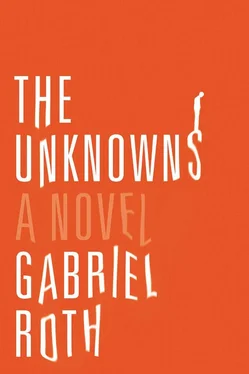“Whoa!” Maya says.
“See, after the divorce my mom continued doing my dad’s laundry for a while.”
“Get out.”
“I swear to God.”
“After they were divorced ?”
“She’s a soft touch,” I say. “He moved into this place without a washer and dryer, and he would bring over his laundry when he dropped me off on Sunday nights. She only did it a couple times before she told him to do his own goddamn laundry.” Years later I discovered that there were indeed a washer and dryer in the basement of my dad’s building, but I don’t get into this, because my father and his character flaws are not the point of the story. “So my mom is asking this guy how he takes his coffee when my dad walks in in his undershirt — you know, like a wifebeater? He’s spilled a bunch of tomato sauce on his shirt, and he doesn’t have anything else to wear to the class he’s teaching tomorrow.” I have fabricated this explanation — in fact I have no idea why my dad came over to pick up the laundry instead of waiting until Sunday when he’d be there anyway. Was he really wearing his undershirt? That’s how I remember it, but it’s possible that I’ve added that detail when telling the story on some previous occasion. It gives the scene more color, though. “He had called my mom, and she’d said he could let himself in and pick up the laundry, which my mom had folded for him and left in a plastic laundry basket. So my dad lets himself in, and this guy, my mom’s date, sees my dad come in the door in his wifebeater and says, What the hell is going on here ?
“My dad, I should point out, is not tough, but he’s big, and he could probably fit this guy in his stomach. He’s going over to the guy to introduce himself, and the guy looks at my mom and says, I don’t know what kind of sick arrangement you people have, but I want no part of it ! and walks straight out the door.”
Maya laughs at the punch line, but she seems to recognize that the story is not, ultimately, a comedy. She asks a bunch of questions about my parents, which reduce to Is he really that clueless ? and Does she ever stand up for herself ? My answers hint at something I realize I want her to know: I’m self-invented; I had no one to learn from. This may be why I told the story in the first place.
When she’s out of questions, she sets up an anecdote of her own. “OK, I’ve got one,” she says. “Ready?”
“I am so ready,” I say.
The rest of the evening glides along as if on rails. At some point we finish the drinks and effortlessly escalate to dinner. (“So are we gonna get dinner?” I say. “Hell yes,” she says, and we nod at each other to say Nice job .) In the restaurant, as the hostess leads us to the table, I set my hand lightly on the small of Maya’s back to indicate that she should go first, and this gentle first attempt at physical contact comes off without a hitch. It’s more crowded than the bar, but we’re off in a corner and the walls are hung with heavy velvet curtains. We sit down and, perhaps in response to my boldness with the hand-on-the-back thing, Maya throws me a fastball.
“So did you hook up with Lauren?” she asks.
“I did,” I say. “I hooked up with her.” I can handle this.
“But you didn’t want to pursue it?”
“I guess not. I don’t think either of us really saw it as something to pursue. Is she… did you talk to her about it?”
“Not really,” she says. “I mean, I didn’t get the blow-by-blow.” She does not grin saucily as she says this.
After the appetizers have been cleared I excuse myself, walk confidently to the bathroom, lock the door behind me, and allow my limbs to go slack, rolling my head alternately clockwise and counterclockwise as the dopamine of infatuation sloshes around with the alcohol in my brain. In the safety of the burgundy restroom, decorated with photographs of tailfinned American cars and decaying neocolonial palaces, I look back in wonder at the past two and a half hours. How did I learn to do this, and will I be able to sustain it when I get back to the table? At any moment the waiter will bring my plate of medium-rare steak strips with onions and potatoes. This infusion of protein and salt is exactly what my body wants; how thoughtful, how prescient of my past self to arrange it! While urinating I look in the mirror on the left wall and only half recognize myself: a smile is organizing my features into their most harmonious proportions, and my usually sallow cheeks are flushed with beer and happiness. I pull off a couple sheets of toilet paper and dab at my forehead to take the shine off, carefully keeping the stream aimed into the toilet bowl.
An hour later, we are figuring out what happens next. Part of me is convinced that there will never be a better time for us to have sex; another part desperately wants to get away before I can screw up. Of course, it’s not my decision.
“So,” we say to each other outside the restaurant. Then she says, “I should be getting home,” and smiles beautifully. “Walk me to my car.”
We pass the assortment of pedestrians — after-dinner yuppies, Latino adolescents, homeless alcoholics — who make up the Mission’s thriving urban street culture. A bearded panhandler with crimson skin mumbles at us, and some suicidal ebullience tempts me to ostentatiously drop a twenty-dollar bill into his Styrofoam cup, but I don’t, because tonight my superpowers are strong enough to defeat even my own personality.
Here’s her car. It’s a red Acura, old, kind of beat-up, totally unexceptional, except that it’s hers and thus imbued with magic. I try to memorize it, as if it were a clue. “So this is it,” she says, and I turn to her, heart pounding, and our eyes lock and the world pours itself through a funnel and everything but us is revealed to be an illusion. Neither of us flinches. We hang here long enough to etch the moment onto the surfaces of our brains, so that in every one of the infinite possible futures we will each be able to remember exactly what the other looked like in the moment right before we started kissing, when we had no inkling of the world of trouble to come.
Much to the surprise of the builders of the first digital computers, programs written for them usually did not work.
— Rodney Brooks, Programming in Common LISP
THE DESKS IN MY new homeroom were laid out in a five-by-five grid, somewhere on which was located the socially optimal spot. My mother, unsure how long the drive to MLK would take, had erred on the side of caution, and all but three desks were still available. The choices of the first three arrivals suggested starkly different intentions: two girls in ornate sweaters sat front and center, while in the last row a boy reclined his chair against the wall, his eyes shut. The boy’s haircut was horizontally bifurcated at the level of his ears, shaggy above and close-cropped below. I considered joining him in the back row, and perhaps mimicking his insouciant posture, but that would have drawn too much attention, so I opted for a seat in the classroom’s exact center. Pleased with my choice I settled in, savored the symmetry of rows and columns around me, admired the perfect diagonals that stretched from my seat to each corner of the room. At once my satisfaction spoiled: the midpoint was the most noticeable, the most calculated. I snatched my bag and scrambled to a seat one row back and one column to the left, although no one else had come in yet. I was happy with this innocuous choice, but I feared that the boy with the haircut had seen the switch and perceived my decision-making process at work. In attempting to avoid the appearance of calculation, had I exposed my calculation? I turned back and glanced at him, and our eyes met. By looking, I had given myself away.
Читать дальше












